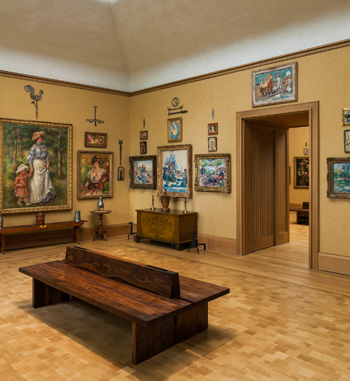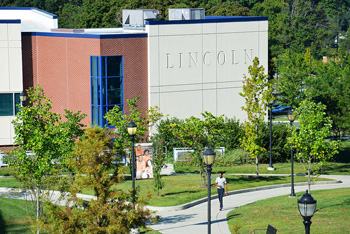- Posted in All University
- Category: Campus News
New Museum Studies Program to Increase Diversity in Nation’s Cultural Institutions
Lincoln University, Pa. — Lincoln University Interim President Richard Green announced the launch of the Lincoln University Museum Studies program. This program is an innovative collaboration with the internationally acclaimed Barnes Foundation. Through this new major, Lincoln University will establish itself as a pioneer in advancing diversity in the nation’s cultural institutions.
“This collaboration will capitalize on the legacy of progressive values and innovation shared by Lincoln University and the Barnes Foundation,” said Green. “Combining the resources of these two institutions will make Lincoln a leader in preparing African American students for careers in the museum professions, a field where African Americans have been historically underrepresented.”
A Mellon Foundation study reveals that only 4 percent of the nation’s museum leadership is African American; the research concluded that very few African Americans acquire the skills to enter the next generation of museum leadership. According to the Mellon study, “diverse educational pipelines into curatorial, conservation and other art museum careers are going to be critical if art museums wish to have truly diverse staff and inclusive cultures.”
“This program will offer students rich courses that are complemented by hands-on, project-based learning. Students’ unique opportunities will include access to staff, collections, and other resources at Lincoln and the Barnes Foundation,” said Blake Bradford, the newly appointed director of the Museum Studies program and former Bernard C. Watson Director of Education at the Barnes Foundation. “The new Museum Studies major will provide students the tools that are critical to begin careers or pursue graduate studies in the museum field.”
Lincoln’s museum studies students will hone their skills through rigorous coursework, paid internships, enrichment programs and presentations from celebrated artists and museum professionals, exposure through hands-on interactions with high quality collections, mentoring and career guidance. The unique alliance of the first degree-granting Historically Black College University and the Barnes Foundation will capitalize on the strengths each institution provides.
This is a vibrant field of study and career opportunities for curators and conservators, education directors, business managers and other professionals. According to the American Alliance of Museums, more than 400,000 people work in museums which are visited by 850 million people each year, more than the attendance at sporting events and theme parks combined.
“We are thrilled for the expanded opportunities Lincoln University’s new Museum Studies program affords students as they pursue advanced study and careers in the field,” said Thom Collins, executive director and president of the Barnes Foundation. “Blake’s role as the director of the program is an important one for the Barnes, as it enriches our important and longstanding relationship with the university. We look forward to welcoming more Lincoln students to learn in our galleries alongside some of the most important works in art history.”
This new undergraduate degree will give students access to a rich, multicultural art experience via:

Room 18 north west view, The Barnes Foundation, Philadelphia. 2012 © Tom Crane and Benjamin Riley.
- Lincoln University’s 3,000-piece collection of African Art and Material Culture: sculptures, masks, vases, totems, pottery, and jewelry—evidence of the spiritual and cultural practices of Nigeria, Congo (DRC), Ghana, Cameroon, Liberia, Ethiopia and Angola.
- The Barnes Collection, one of the world’s finest collections of impressionist, post-impressionist, and early modern paintings including 181 Renoirs, 69 Cezannes, 59 Matisses, 46 Picassos, 16 Modiglianis, seven Van Goghs and a vast array of African sculptures, and antiquities from Asia as well as Native American ceramics and textiles.
The Museum Studies program is a product of an institutional collaboration between Dr. Albert C. Barnes, founder of the Barnes Foundation, and Dr. Horace Mann Bond, the first African American president of Lincoln University, begun 53 years ago. These men forged a commitment to an arts-centered educational mission that would benefit African American students. The enduring relationship, overlapping educational objectives, and combined resources of Lincoln University and the Barnes Foundation will provide a singular platform for the success of this program.
There is no better time for a focus on visual arts management. Leading universities are responding to student demand and a recognition that the arts and creativity will be essential to a new and diverse generation of problem solvers. Driving a dynamic academic connection between Lincoln and the Barnes Foundation will put Lincoln on track to become a national center for thought-leadership in museum studies, shaping the future of America’s cultural institutions.
It is fitting that a portion of the nation’s new cultural leaders will be the product of a collaboration between Lincoln University and the Barnes Foundation. The Museum Studies major builds upon Lincoln University’s impressive legacy. It is committed to a mission of maintaining a nurturing and stimulating environment for learning, teaching, research, creative expression and public service for a diverse student body, faculty and workforce. With myriad firsts to its credit and a tradition of producing
world leaders, the University engages in programs that increase knowledge and global understanding. The University’s diverse student body and expert workforce foster a supportive environment for professional and personal growth and mutual respect.
The Museum Studies program will begin its first full year in the 2017-2018 academic year. The first students can apply for the major on Commitment Day, March 31, 2017.

The Student Union Building, Lincoln University, PA. 2015. Photo by Shelley Mix.
ABOUT LINCOLN UNIVERSITY
Founded in 1854, Lincoln University (PA) is the first of four Lincoln Universities in the world and is the nation’s first degree-granting Historically Black College and University (HBCU). The University combines the elements of a liberal arts and science-based undergraduate curriculum along with select graduate programs to meet the needs of those living in a highly technological and global society. Today, Lincoln, which enrolls a diverse student body of approximately 2,100 men and women, possesses an international reputation for preparing and producing world-class leaders such as Thurgood Marshall, the first African American U.S. Supreme Court Justice; Lillian Fishburne, the first African American woman promoted to Rear Admiral in the U.S. Navy; Langston Hughes, the noted poet; Kwame Nkrumah, the first president of Ghana; Nnamdi Azikiwe, the first president of Nigeria; Saara Kuugongelwa-Amadhila, the first female Prime Minister of Namibia and a myriad of others.
ABOUT THE BARNES FOUNDATION
The Barnes Foundation (barnesfoundation.org) was established by Albert C. Barnes in 1922 to “promote the advancement of education and the appreciation of the fine arts and horticulture.” The Barnes holds one of the world’s finest collections of impressionist, post-impressionist and early modern paintings, with extensive works by Pierre-Auguste Renoir, Paul Cézanne, Henri Matisse, Pablo Picasso, Henri Rousseau, Amedeo Modigliani, Chaim Soutine, and Giorgio de Chirico; works by American masters Charles Demuth, William Glackens, Horace Pippin, and Maurice Prendergast; old master paintings; important examples of African sculpture; Native American ceramics, jewelry, and textiles; decorative arts and ironwork; and antiquities from the Mediterranean region and Asia. While most collections are grouped by chronology, style, or genre, art at the Barnes is arranged in ensembles structured according to light, line, color, and space—principles that Dr. Barnes called “the universal language of art.” The Foundation’s programs include First Fridays, young professionals nights, tours, tastings, and family programs, as well as Barnes-de Mazia Education Program courses and workshops. These programs advance the Foundation’s mission through progressive, experimental, and interdisciplinary teaching and learning.